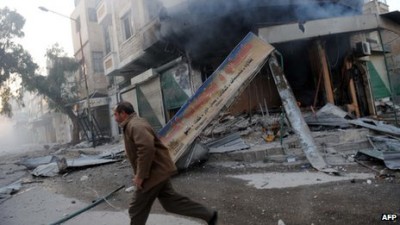
By Ian Pannell
As the UN expresses dismay at continuing violence in Syria, optimism is still found amid the ruins, in some parts of the country.
Abu Mohammed says he wept when he saw what the soldiers had done.
He had had to wait for two days for the troops to pull back before he dared to venture home.
That is when he saw the still smouldering remnants of what had been his life.
His apartment had been deliberately set on fire. Every wall, floor and ceiling was blackened and cracked and all of his possessions had been reduced to ash.
I first met Abu Mohammed in February. He lives in Idlib province in northern Syria. I will not say exactly where, to protect his identity and Abu Mohammed is not his real name.
But he is an English literature graduate who is an unlikely recruit to the rebel Free Syrian Army.
A young, thoughtful man who is more at ease discussing William Shakespeare and Samuel Beckett than military tactics.
The last time I met him, he told me: “I want people in Syria to carry a pen, not a sword.”
But conflict hardens the soul and forces people to make choices based on necessity not want.
In the time since I last visited, the full force of President Assad’s military has been unleashed on this part of Syria.
Towns and villages have been shelled, hundreds have been killed, people have been detained and homes have been burned.
“I had 500 books; English novels and plays, American poetry and all of them are gone,” Abu Mohammed said.
He gave me a guided tour of the charred shell of his home. I could just about make out a series of black rectangular marks on the floor of what had been his library.
“If they burned all my home it’s ok,” he said, “but not my books – I cried when I saw my books.”
He has lost faith that the international community will help.
“Can Kofi Annan come and see my library?” he shouted, adding that the former UN secretary general’s six-point plan lay in the ashes of his home.
“If they burned all my home it’s ok,” he said, “but not my books – I cried when I saw my books.”
He is angry and he is not alone.
Those we met feel they have been abandoned by the outside world. Many asked why the West refuses to help, why Syria is different from Libya, where the international community did intervene.
I tried to explain that the Europeans and Americans felt they were helping but that Syria was a far more complex country in the heart of a very difficult region.
But it is hard to make a convincing case for nuanced foreign policy to people who have been on the losing side of a life and death struggle for more than a year.
In fact for many people in Idlib, their fight with the Assad government is not just more than a year old, it is more than three decades old.
A protest movement erupted in this region in the early 1980s.
It had an Islamist bent and called for an end to what the Sunni majority here still see as routine discrimination at the hands of the ruling family, who are from the minority Alawite sect of Shia Islam.
It was eventually crushed in a ferocious government offensive that left perhaps tens of thousands dead and many imprisoned.
This goes some way to understanding that what is happening in Syria is not just another off-shoot of the Arab Spring, it is a generations-old movement for change.
It also explains why it has not yielded to the pressure it has been put under.
In a grubby tent that offered little shelter to the elements, we met a group of fighters squatting around a solitary pear-shaped paraffin lamp.
They were dirty, tired and beaten. The government’s offensive has had an effect and for now at least, it seems the armed insurgency is over.
But the popular uprising is far from being bowed.
Abu Mohammed and I talked a bit about the authors whose works had filled the shelves of his library.
He moved through the ages from William Shakespeare to Jane Austin to Samuel Beckett, declaring that Beckett’s Waiting for Godot was his favourite play.
He wanted my interpretation. What did I think the enigmatic absurdist drama really meant?
It is about two men waiting for someone who never arrives and so, feeling rather gloomy about what I had witnessed over the last few months, I waffled a bit about inaction and fate.
“What does it mean to you?” I asked.
Abu Mohammed smiled. “Hope,” he said. “I believe Godot is hope.”
Death and destruction had been wrought upon his hometown and we were standing in the ruins of what had been his beloved library, yet his faith was undiminished.
“You know, we are waiting for Godot,” he laughed.
The people I have been talking to here share an absolute conviction that this time will be different, that what their fathers began will be finished by today’s generation.
And after decades of what they see as state-sanctioned oppression, the spirit of rebellion burns bright – as they wait for Godot.
Waiting for Godot

- Absurdist author and playwright Samuel Beckett born on Good Friday, 13 April 1906 near Dublin
- Settled in Paris in 1937 where he lived for the remainder of his life
- First literary triumph came in 1953 with premiere of Waiting for Godot in Paris
- Famed for its bleak, tragicomic style, the play in which ‘nothing happens’ features Vladimir and Estragon waiting endlessly for man named Godot
- ‘Godot’ has been voted ‘the most significant English language play of the 20th century’
- Awarded Nobel Prize for Literature in 1969
- Died in Paris on 22 December 1989 aged 83
BBC

Leave a Reply
You must be logged in to post a comment.